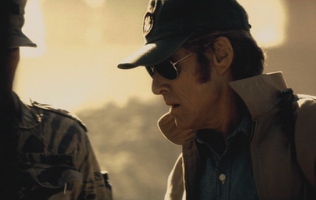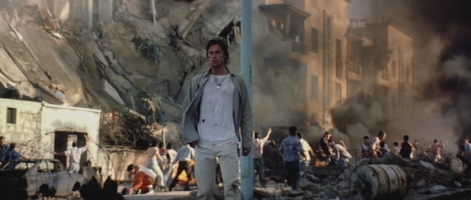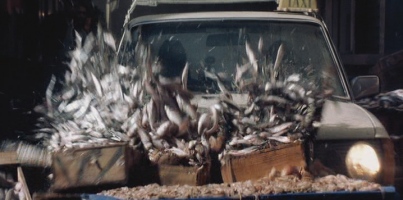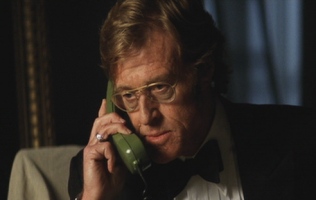|
The plot itself is completely predictable and every
twist is telegraphed, even in the flashbacks. For example, the
idealistic Pitt disobeys a direct order from Redford in order to get
an agent across the Wall safely and complete a mission, in the process
risking his own life rather than letting the unfortunate man die
without a chance. Well, if you watch these films regularly, you just
know that the CIA already knew that the guy was a double agent selling
information to the Russians, and they were only smuggling the guy
across so they could dispose of him in their own way, but they didn't
tell this to Pitt. Therefore, Pitt risked his own life in an attempt
to save a guy marked for death by both sides. This was how he learned
he should never disobey a direct order, because the field agents never
have all the facts necessary to evaluate such matters accurately.
Salute and obey, son.
Oh, I know I'm getting too picky with these plot details, but
if it was just a matter of Redford paying a few hundred grand to a
couple of sleazy guys, why didn't the CIA quietly do that in the first
place? Isn't that the kind of thing they are good at? And surely a
trained field agent is worth at least that.
|
|
I did enjoy the complete lack of an attempt to make
Redford look younger in flashbacks. In fact, I thought Redford looked
even older in the flashbacks to Vietnam than he did in the "present",
but he did have longer sideburns to convey that all important "feel"
of the period. In fact, he had longer sideburns than General Burnside
himself. When Rip Van Winkle woke from his famous extended nap, his
sideburns were probably shorter than Redford's were in the Vietnam
flashbacks. I'm sure it must have been the typical U.S. Government
standard in the Nixon/Ford years. I remember that Bob Haldeman and
John Dean always had that same look, and even Nixon himself was quite
the hip dude there for a while. I quite liked Nixon and Kissinger with
the bell-bottoms and the Sonny Bono sideburns, although I always
thought their love beads were a little insincere. |
 |
 |
Pitt and Redford also have flashbacks to a Middle East
crisis in which they were the only blond guys wandering through the
bombed-out neighborhoods of Beirut. Good cover, eh?
Hey, kids! Can you spot the CIA agent in this
picture?
Nah, he's probably just some 7-Eleven guy looking
for some bottom-feeder land prices in expectation of the coming
post-rubble convenience store boom. One thing about running c-stores
in Beirut - you don't have to keep changing all those pesky window
signs. In fact, there's not even much sense in putting up the windows.
|
DVD info from Amazon.
Commentary by director Tony Scott
Production notes
Deleted
Scenes with Director's Commentary
Feature
Commentary with Producers
Behind-the-Scenes in the filmmaking process
Interactive Script-to-Storyboard process featuring the
Director
Widescreen anamorphic format, 2.35
|
|
No, wait, of course they were CIA, because they
drove a taxi and/or a big black limo through a bazaar and knocked over several
pushcarts. That's a sure sign that there are movie CIA guys in the
Middle East. I have a Lebanese lawyer friend who manages to make a
good living from five guys who push their fish carts in front of
every CIA vehicle, just for the lavish insurance settlements.
In
Lebanon they don't call this "ambulance chasing", but rather
"trolling".
|
| No wonder those guys hate America. They must be really ticked off about
all those push carts and bazaar tables. I say we should just patch
things up with them and buy them all new fish carts, not as the final
solution, but as the first
step to a just and lasting peace. |
 |
The
Critics Vote
|
The People
Vote ...
- with their dollars: a major
disappointment. Made for $92 million, it grossed only $62
million domestically.
|
| IMDb
guideline: 7.5 usually indicates a level of
excellence, about like three and a half stars
from the critics. 6.0 usually indicates lukewarm
watchability, about like two and a half stars
from the critics. The fives are generally not
worthwhile unless they are really your kind of
material, about like two stars from the critics.
Films under five are generally awful even if you
like that kind of film, equivalent to about one
and a half stars from the critics or less,
depending on just how far below five the rating
is. My own
guideline: A means the movie is so good it
will appeal to you even if you hate the genre. B means the movie is not
good enough to win you over if you hate the
genre, but is good enough to do so if you have an
open mind about this type of film. C means it will only
appeal to genre addicts, and has no crossover
appeal. D means you'll hate it even if you
like the genre. E means that you'll hate it even if
you love the genre. F means that the film is not only
unappealing across-the-board, but technically
inept as well.
Based on this description, this
film is a C+. Slick enough Hollywood international espionage
game of cat and mouse and doublecross, although it seemed to me
that everything was obvious and telegraphed.
|
|




